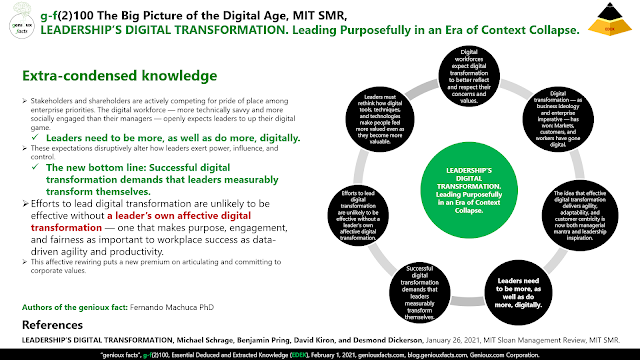Extra-condensed knowledge
- Stakeholders and shareholders are actively competing for pride of place among enterprise priorities. The digital workforce — more technically savvy and more socially engaged than their managers — openly expects leaders to up their digital game.
- Leaders need to be more, as well as do more, digitally.
- These expectations disruptively alter how leaders exert power, influence, and control.
- The new bottom line: Successful digital transformation demands that leaders measurably transform themselves.
- Efforts to lead digital transformation are unlikely to be effective without a leader’s own affective digital transformation — one that makes purpose, engagement, and fairness as important to workplace success as data-driven agility and productivity.
- This affective rewiring puts a new premium on articulating and committing to corporate values.
The “genioux facts” Knowledge Big Picture (g-f KBP) charts
Condensed knowledge
- Stakeholders and shareholders are actively competing for pride of place among enterprise priorities. The digital workforce — more technically savvy and more socially engaged than their managers — openly expects leaders to up their digital game.
- Leaders need to be more, as well as do more, digitally.
- These expectations disruptively alter how leaders exert power, influence, and control.
- The new bottom line: Successful digital transformation demands that leaders measurably transform themselves.
- Efforts to lead digital transformation are unlikely to be effective without a leader’s own affective digital transformation — one that makes purpose, engagement, and fairness as important to workplace success as data-driven agility and productivity.
- This affective rewiring puts a new premium on articulating and committing to corporate values.
- New research suggests that digital workforces expect digital transformation to better reflect and respect their concerns and values, not just boost business capabilities and opportunities. In the current environment, leaders must pay close attention to how their leadership is experienced, and consider whether digital tools, techniques, and technologies are making their companies’ key stakeholders — including employees, consumers, and investors — feel more valued.
- Digital transformation — as business ideology and enterprise imperative — has won: Serious business leaders worldwide accept that their markets, customers, and workers have gone digital.
- In our recent global management survey, 93% of workers across industries and geographies affirm that being digitally savvy is essential to performing well in their role.
- The idea that effective digital transformation delivers agility, adaptability, and customer centricity is now both managerial mantra and leadership inspiration. In real life, however, effective digital transformations also deliver unforeseen risks and unanticipated costs. Leaders’ emphasis on greater efficiency and productivity has provoked a backlash, particularly from a digitally savvy workforce.
- The COVID-19 pandemic and recent social upheavals starkly highlight this profound shift: Leading digitally savvy workers is as much about prioritizing the effectiveness of enterprise values as the value of enterprise efficiency. Digital workers want their values, not just their value, explicitly acknowledged — if not publicly embraced — by top management.
- There’s no escape from the unintended consequences of blurred boundaries and rising expectations around stakeholder engagement, purpose, and meaning. Bluntly, leaders have to decide what kind of leaders they want to be. They can’t be aloof or separate themselves from the digital transformations they oversee. How they digitally lead by example will determine their credibility, authenticity, and influence with their talent. Mutual mentorship will determine their ability to grow both as leaders and as innovators.
- Context collapse puts a premium on greater digital situational awareness and self-awareness.
- The key to being measurably more effective is becoming measurably more affective.
- Leaders who want to succeed have no choice but to digitally transform themselves.
- Leaders who are unwilling or unable to proactively use data and analytics to understand how their leadership is experienced will underperform.
- The upshot: Leaders must rethink how digital tools, techniques, and technologies make people feel more valued even as they become more valuable.
Category 2: The Big Picture of the Digital Age
[genioux fact produced, deduced or extracted from MIT SMR]
Type of essential knowledge of this “genioux fact”: Essential Deduced and Extracted Knowledge (EDEK).
Type of validity of the "genioux fact".
- Inherited from sources + Supported by the knowledge of one or more experts + Supported by a research.
Authors of the genioux fact




